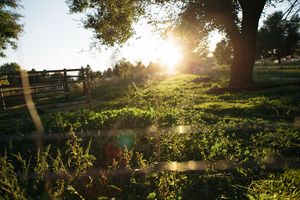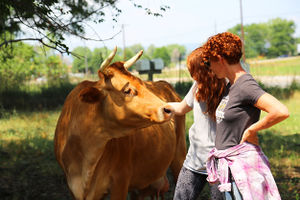Jacob Springs Farm
Jacob Springs is a diversified beyond organic farm, located near Boulder, Colorado on the southeast corner of Arapahoe road and 75th street just minutes from Boulder on the jump bus line. We specialize in grass-fed proteins. We have eggs, pork, beef, lamb and chicken, as well as grass-based milk from 13 lovely cows; fruit and vegetables in season, apples, beets, garlic, leeks, greens, comb honey from our bees and plenty more. We manage around 450 acres.
We are passionate advocates of Regenerative Grazing and we are actively researching and developing techniques and technology for subsistence farmers worldwide. In close cooperation with Zambeezi, we created a co-op with nearly 1,200 small-scale farmers in Zambia, Africa to improve their productivity and sustainability. We are currently ten people and a couple of dogs, led by Hazel an English Shepherd. We enjoy sharing meals together a few times a week. Recently our farm has been awarded the lease on a wonderful City of Boulder OSMP property after several years of battling serious issues with the City of Boulder OSMP Bidding Process!
"What's with your website?" Our RAWiki project aims to make detailed information about regenerative agriculture available to other farms.
Contents
Farm programs
You can access all of Jacob Springs' amazing products at our members-only Jacob Springs Farm Store (opening April 2024) located on the home farm property at 7602 Arapahoe.
As a diversified, "everything farm" , Jacob Springs organizes it's production into various farm programs;
Currently the major farm programs for customers are the Jacob Springs Farm Meat CSA, the Raw Milk Shares, heirloom grains in cooperation with Moxie Bakery and the Colorado grain Chain, Honey, amazing pastured pork and specialty vegetable crops as available, as well as our self-serve Organic layer feed for chickens and ducks Call or email us for more information. farmteam (at) Jacobsprings.com
A full list of current and past programs is found here:
History
Jacob Springs Farm was founded by Andre Houssney in the spring of 2010 with the purchase of the Condon/Debaker property close to Boulder. Prior to the purchase, the farm, located at Jacob's Corner, had been named "Cottonwood Farm" after a row of giant cottonwood trees which had been planted along Arapahoe Road (originally called Valley Road) in the 1860's. Since the cottonwoods were now gone, having been cut down in 2005 when Arapahoe Road was widened, and since the Condon Family had chosen to continue using the name "Cottonwood Farm" on land they lease from the Jacobs family to the West of 75th street.
The name "Jacob Springs Farm" was chosen to recognize the Jacobs family who had long farmed at this intersection, to recognize farm's location at Jacob's Corner, the springs of water on the property - including the one at Jacob's corner and to recognize the Biblical story of Jacob's Spring in the book of John chapter 4.
Daily Schedule
The farm schedule begins each day Monday through Saturday at dawn (see Jacob Springs dawn start times calendar) with a 15-20 minute meeting prior to chores. Volunteers, wwoofers, and farm team members are expected to attend. Chores follow the meeting. Workers are invited to join in a (typically) wonderful breakfast following chores. Over breakfast, we typically engage in an informal discussion topic. After breakfast, special projects continue until 11 or noon.
see also
- What to expect for volunteers
- What to expect for WWOOFers
- Current weather
- A few years ago our farm was awarded the lease on a wonderful City of Boulder OSMP property after several years of battling serious issues with the City of Boulder OSMP Bidding Process!
Philosophy
We take nature as the best model for our ecosystem design. Informed by technology, science, traditional agricultural practices from around the globe, principles of permaculture and regenerative grazing as promoted by Allan Savory and the Savory Institute we attempt to create a wholistic, financially viable and ecologically sound human community around food production and land restoration.
Agriculture is the primary way humans interact with the ecosystem. As such, it is key to many of the global problems we face. We are currently challenged with problems of the poor quality of food, poor profitability for small-scale farmers, the need to increase production for a growing population, problems with pollution and waste, declining biodiversity and climate change.
We believe that the solutions for the problems in agriculture are fundamentally ecological and not technological. Technology can help! Innovative solutions, such as those developed in our farm maker-space initiative Agronimo can assist us in applying ecological solutions to local and global problems, and science informs and enables us to better understand and vet solutions to these problems. There is much, however, that we still don't know - gleaming aquaponic warehouses and synthetic meat growing in petri dishes are not viable solutions, indeed they are further steps in the wrong, reductionist and simplistic directions that we have been heading as a society. We, instead, look to solutions from nature, supported by technology. Natural systems are productive, complex, high-tech and balanced. As we observe the patterns in nature and seek to emulate them, we are taking a shortcut in the right direction, we believe that studying nature enables us to begin learning to think the thoughts of the creator. This is what we mean by farming God's way. This principle prompts us to seek out solutions in farming principles such as Permaculture, Holistic Range Management, and many others.
We have a complex definition for success but our shorthand version for ecological success is simple:
- Observe an increase in biodiversity over time, in soil microbes, in livestock genetic diversity, in plant life and in wildlife.
- Observe an increase in soil fertility over time, including an increase of soil organic matter (soil carbon) which means a decrease in atmospheric carbon.
Other goals are:
- to maximize biomass production and carbon uptake
- to maximize carbon sequestration
- to minimize use of energy and materials, especially non-renewable forms
- to increase water retention capability of landscapes; in soils, biomass and in surface features.
Values
We exist to love and serve by:
- Loving and caring for our human inheritance, God's creation
- Loving and caring for others; customers, fellow workers, local and global community though compassion and good food
- Living joyfully, honestly and well, to make a living and care for ourselves
Goals
- Education of young farmers through WWOOF and internships
- Demonstration of a model of profitability in regenerative family farming
- Production of high quality products that are healthy and nutrient dense
- Ecological restoration of our property as well as adjacent and leased land
- Achievement of a high level of animal well-being through reproducible animal husbandry practices
- Refinement of our target market through CSA, direct sales, and other means
- People care including health and safety, work satisfaction, spiritual well-being, team dynamics and morale
- Demonstration of the Kingdom of God through Christian community, Ethics and service
Labor
- Dull work is not just for dull people. Many of the worlds best ideas came to people working dull jobs, lots of our labor is boring, it's true, but this frees our minds to contemplate deeper things for many more hours a week than the typical worker within an information economy. We strive to take pleasure in the routine and boring aspects of farming, just as in the exciting and stimulating ones.
- Labor and rest for land and people - We believe that hard work is good. Productivity is a necessity, not only for survival but for people and land to reach their highest potential. At the same time we believe that rest is essential for humans to thrive (main article:Sabbath) and rest is also one of the most powerful tools we have for soil and pastures. The fourth commandment of the law of Moses, as recorded in the Bible reads "Six days you shall labor, and do all your work, but the seventh day is a Sabbath." In farming, there is always more work to be done, it can therefore be easy for work to consume all your time. Although this may seem to be productive, there comes a point where constant work degrades the effectiveness of the worker and the discipline of rest must be observed to keep the worker sharp. Land also is frequently overworked, and pastures overgrazed. More commonly perhaps, people are inclined to be unproductive, excessive rest or recreation is dulling to the senses and reduces the productive output of a life. We acknowledge the ancient wisdom of "Six days you shall labor" and "Remember the sabbath". We attempt to understand and apply the principles and rhythms of fallowing ground and rotating stock for the long-term benefit of the whole. .
- How to make a mistake is one of our guiding principles for how to work together.
Pricing
The Jacob Springs price list is a reference for what things should cost in our market. Note that the list is not intended to be a list of what we sell or have in stock, is subject to change without notice and it does not constitute an offer but it is for reference only.
Infrastructure
See main article: Infrastructure
Administrative Stuff
To contribute a todo/administrative note for morning meeting (not anonymous!), text ![]() . Your message and phone number will be visible to everyone at the meeting.
. Your message and phone number will be visible to everyone at the meeting.
- Jacob Springs Farm:Seasonality
- JacobSpringsFarm:Weekly agenda
- JacobSpringsFarm: to do lists
- JacobSpringsFarm:breeding records
- JacobSpringsFarm:weather observations
- JacobSpringsFarm:Kolb bid
- JacobSpringsFarm:Food Inventories
- JacobSpringsFarm:Goals
- Andre log
- JacobSpringsFarm:Calendars
- Funny Quotes
- JacobSpringsFarm:Discussion Topics
- JacobSpringsFarm:Value added log
- JacobSpringsFarm:Maintenance Record
- House Recipes


